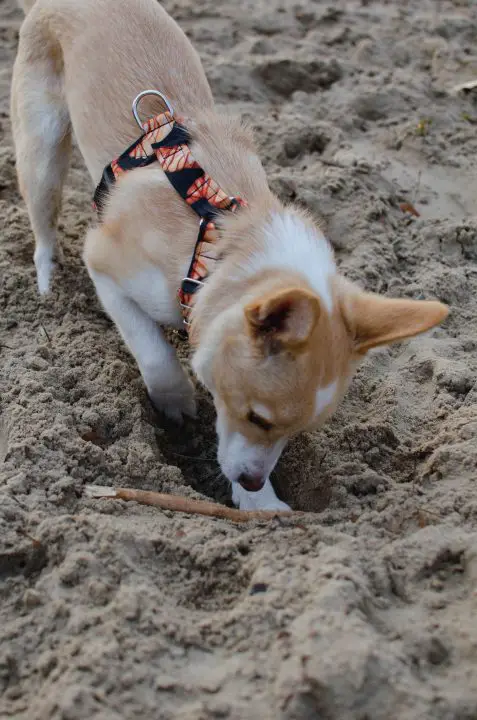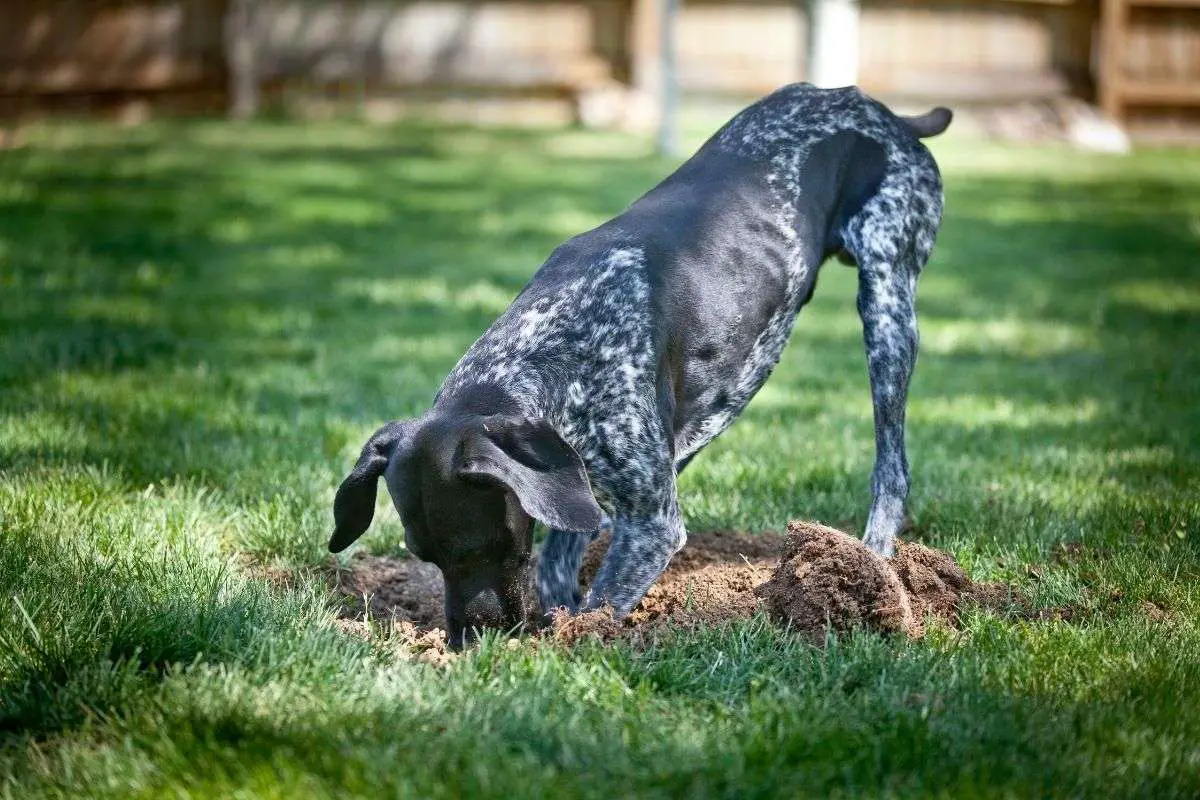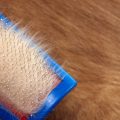Welcoming a dog into your family is one of the most joyful and exciting experiences. Life becomes full of fluffy cuddles, playing fetch, and delightful morning walks around the block. Sounds idyllic, right? Unfortunately, we are all too aware that owning a dog isn’t all rainbows and unicorns. As much as it can be wonderful, it can also be particularly stressful, especially when your dog is displaying destructive behaviors, such as excessive digging.
Watching your dog dig excessively can be distressing for a few reasons. In addition to being concerned about your beautiful garden, it’s likely that you’re concerned about their well-being and safety. If you need to stop your dog from digging, we’re here to help! Below, we discuss why dogs dig, and how to best stop them from doing so. Whether your dog is digging due to distress, or simply because they love to look for hidden treasure, we have some advice for you!

Table of Contents
- Why Do Dogs Dig?
- How To Stop Your Dog From Digging
- What Dog Breeds Dig The Most?
- Stopping a Dog from Digging – Doable!
- FAQs
Why Do Dogs Dig?
Before we get into preventative measures, it is first important to understand why your dog might be digging in the first place.
Animal Instinct
According to the American Kennel Club (AKC), some digs dig because it is an instinctive behavior that they have inherited from their wolf ancestors. It is a behavior that comes very naturally to them, similar to that of barking or even wagging their tails.
Even dogs who don’t dig very much outside, often perform digging movements when on their bed before lying down. In these cases, digging isn’t anything to be concerned about.
However, if your dog is causing havoc in your garden, keep reading to explore other potential causes.
Lack Of Stimulation
If a dog is feeling bored or lonely, digging is sometimes their go-to way to occupy themselves. This might not sound too sinister, however, a one-time occurrence of this behavior could turn into a repetitive habit.
If the environment in which your dog is in most of the time isn’t stimulating enough, or they aren’t getting enough interaction with both humans and dogs, they may begin to dig to a destructive extent.
Unsuitable Environment
Animals, in general, will often use digging as a way to find comfort or protection from an unsuitable environment.
For instance, if you leave your dog outside on a hot day with little access to shade or water, they may dig as a coping mechanism. They may also do this if they’re left outside in the cold.
Stress Or Anxiety
Stress and anxiety are key factors in the development of new, destructive behaviors in pets. If your dog has developed a habit of destructively digging out of nowhere, it is likely that stress or anxiety is the culprit.
Unfortunately, it can be tricky to pinpoint what it is that is causing your dog to feel stressed or anxious.
A good place to start is to figure out whether there has been a change in your dog’s daily routine or a sudden change in their life. This is likely to be the cause.
Seeking Prey
Some dogs have a high prey drive. This means that they are likely to go after rodents or other small animals that they can hear or smell under the ground.
As such, these types of dogs are more predisposed to digging behaviors. Breeds such as terriers and dachshunds are likely to do this as they were bred to hunt rodents and small game.
Escape
This might be a bit of an obvious one, but if your dog feels compelled to leave the garden, it will likely begin to dig under fences to tunnel its way out. This might be because there is another dog or animal in the garden next door that it wants to meet.
Treasure
Some dogs like to bury their treasure, such as a special toy or treat to save for later. However, as you’re probably aware, dogs aren’t great at making maps.
As such, when they try to find their treasure at a later date, they often have to dig around quite a bit.

How To Stop Your Dog From Digging
Now that you have a better idea of what is causing your dog to dig in the garden, we can get into some preventative measures.
Remove Stress
If you believe that your dog is digging due to stress or anxiety, it is important to figure out the source of these emotions so that you can remove them if possible.
As mentioned above, if you’re unsure of why your dog may be feeling stressed or anxious, you should first look to any changes in its environment or routine.
It is worth noting that sometimes stressful situations are unavoidable. For instance, if you have recently moved house, this may induce stress or anxiety in your dog.
In cases such as this one, it is necessary to ease the transition as well as you can. One way you can do this is by spending plenty of quality time with your dog.
Exercise
Ensuring that your dog gets adequate exercise is one of the most important things you can do when you’re trying to correct their destructive behaviors.
Different dog breeds require different amounts of activity each day, so be sure to check whether the amount of exercise you’re providing your specific dog is adequate.
Generally, your dog should be exercising outside for at least half an hour a day. This can be garden time or a quick walk around the block.
By doing this, you’re ensuring that your dog is burning off their extra energy in a productive way, rather than a destructive way (such as excessive digging).
Mental Stimulation
People often forget that dogs need to be mentally stimulated, as well as physically stimulated. Some dogs breeds need this more than others, however, it is necessary for all dogs to be mentally occupied in a task at some point each day.
This will prevent your dog from feeling bored, and thus, performing destructive behaviors.
If you’re not sure what exactly you can do to provide your dog with mental stimulation, it’s actually quite simple! You just need to spend time with your dog doing things that it enjoys.
For instance, playing games such as fetch or tug of war, or even just running around with your dog in the garden.
Provide A Suitable Environment
People often forget that dogs can be very sensitive to subpar environmental conditions. If it is particularly hot where you live, make sure that your dog always has access to plenty of water and shade.
Likewise, if it is particularly cold where you live, your dog will need access to lots of warmth.
You should also consider the size of the environment in which your dog lives. Large dogs need a lot of space to roam around.
If they are kept in an enclosed environment for long periods of time, this may induce some stress or anxiety, which can, in turn, induce digging.
As such, always be sure that your dog has enough space to feel comfortable.
Fix Your Pest Problem
If you have a feeling that your dog is digging due to small pests, keep an eye out for signs of invasive rodents or burrowing animals. If you notice signs such as these, call an exterminator and consider pest control for your yard if necessary.

Use Toys As A Distraction
As previously discussed, it is important to keep your dog mentally stimulated. If you plan to be away from your pet for parts of the day, you can use toys to keep them mentally stimulated whilst you’re elsewhere.
Ensure that you stock up on tennis balls, cuddly toys, rope toys, or whatever your dog enjoys playing with the most. If your dog has access to these toys when you’re not there, they are likely to play by themselves. This can prevent boredom that may induce digging.
Use Digging Deterrents
If your dog’s digging is out of control and you need to fix it quickly, some people chose to use digging deterrents.
For instance, you can place plastic chicken wire around 6 inches below the surface of the soil. If you are going to use this method, it is important that you don’t use any material that may harm your dog’s paws (e.g. metal).
Reinforce Fences
If your dog is digging to escape the garden, and you can’t seem to distract it with toys, it might be a good idea to reinforce your fences. You may do this by blocking their favorite digging spots with wood or flat rocks.
Embrace It
We know that your dog digging up your garden can be very frustrating, particularly if you’re a keen gardener. The last thing you want is to have your gorgeous rose bed ruined by your rambunctious puppy.
So, when we say ‘embrace it’, we don’t mean ‘let your dog run wild and ruin your garden’. Rather, we’re suggesting that you channel your dog’s love of digging in a more appropriate way. One way you can do this is by giving your dog a digging spot.
For instance, you can use a sandbox. Simply hide your dog’s favorite bones or toys in the box so that your dog is drawn to digging in the sand. Anytime you notice your dog digging in the garden, redirect them to the sand box.
What Dog Breeds Dig The Most?
If you’re interested in getting a dog, you might want to know which breeds are the most likely to dig. Here is a list of the top ten breeds that dig the most:
- Jack Russell Terrier
- Dachshund
- Cairn Terrier
- Alaskan Malamute
- Smooth Fox Terrier
- Airedale Terrier
- Beagle
- Miniature Schnauzer
- Border Collie
However, this isn’t to say every dog of these breeds will dig a lot. It also isn’t to say that a dog of a breed not on this list won’t dig at all. Use this as a guide if you’re concerned about digging, but understand that it is just a guide.
Stopping a Dog from Digging – Doable!
It can be incredibly frustrating to have a dog that digs in the garden, particularly if you enjoy making your garden look lovely.
There are a number of ways that you can prevent your dog from digging in the garden, however, we recommend using those that deal with the cause of the dog’s destructive behavior.
If your dog continues to feel anxious and displays destructive behavior, take it to the vet to ensure that its health and well-being are ok.
FAQs
Dogs tend to really dislike the smell of vinegar. As such, it may prevent them from digging. To test this method out, simply make a mixture of 50% water and 50% vinegar. Then, spray your dog’s favorite digging spots with this concoction.
This may not work with all dogs. Some will be so driven to dig that they will likely push past the scent, and some dogs won’t be bothered by the scent at all. However, it is definitely worth a try if you’re desperate.
Coffee grounds have been known to repel dogs. If you’re trying to keep your dog away from certain spots in your garden, you could try sprinkling some fresh coffee grounds on the grass. However, coffee could be bad for your dog if it eats a lot of it, so apply sparingly!
This is generally up to you. If your dog doesn’t seem to be digging obsessively, and it isn’t causing much damage, then feel free to leave them to it.
However, if your dog is digging excessively, it might be a sign of something more sinister at play.
As such, even if it doesn’t cause you any distress, it is important to ensure that your dog is healthy and happy. If you’re unsure, it is always a good idea to ask your vet for advice.
They will also be able to give your dog the once-over to ensure that it isn’t distressed due to ill-health.
Yes and no. For some digs, digging is a super fun way to relieve stress and tension. Some also enjoy the mental stimulation they get from burying their treats and toys, and later working to find them again.
However, for some dogs, digging is a sign of much anxiety or distress. In these cases, even though it might seem as if they are enjoying themselves, the underlying cause of the digging needs to be addressed.






